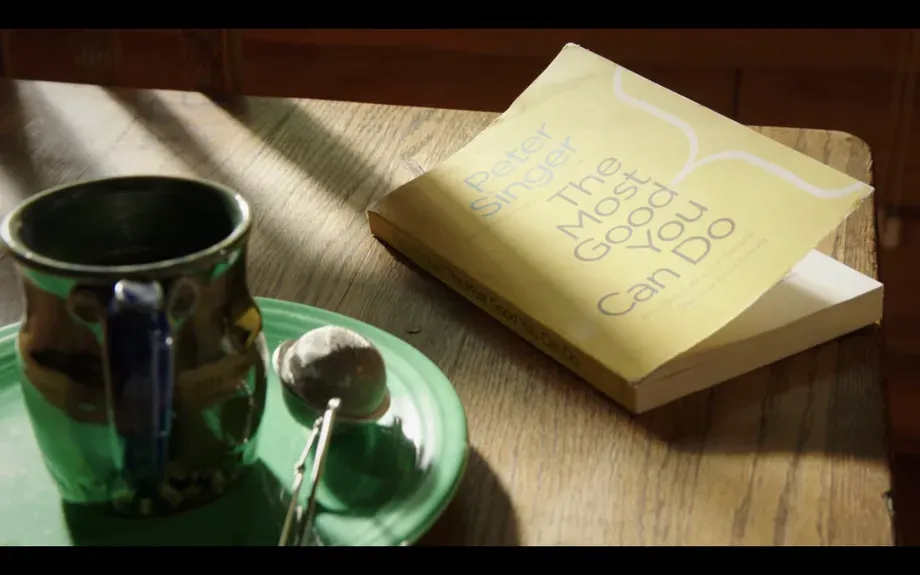How The Good Place taught moral philosophy to its characters — and its creators (Dylan Matthews, Vox)

The only time I can remember feeling like a piece of culture was designed for me, specifically, was when I watched the premiere of The Good Place. (…)
This is … not typically how showrunners think about ending their shows. But nothing about the ideas behind The Good Place is typical. The Good Place has laid out a moral vision that’s surprisingly sophisticated and deeply informed by academic philosophy — a vision that puts learning, and trying, to do good front and center. In the process, Schur and his team have undergone their own process of moral learning, not unlike the one the characters they’ve created have gone through.
If the show has anything like an ur-text, it would be Scanlon’s What We Owe to Each Other. According to Schur, the book forms the “spine” of the entire show, “the book we kept coming back to.” At times, it’s a literal prop. (…)
The title of the book, Schur said, was in itself a key inspiration. “The title, What We Owe to Each Other, stuck in my head and was a quietly, to me, radical idea, because it starts with this presupposition, which is: We owe things to each other. It’s not, ‘Do we owe things to each other?” It’s ‘This is what we owe to each other.’”
What We Owe to Each Other is an extended and at times technical defense of a theory Scanlon calls contractualism: in short, the idea is that to act morally is to abide by principles that no one could reasonably reject.
The meat of the theory appeals to Schur. “What he says in the book is a controversial position, but which I found to be very uncontroversial, which is that you ought to design rules that couldn’t be rejected by the people that you’re having to share the world with,” he explains.
That seems quite immediately applicable in a show like The Good Place. The show at its root is about four people — Eleanor, Chidi, Jason Mendoza (Manny Jacinto), and Tahani Al-Jamil (Jameela Jamil) — who have to form a society together in an afterlife they know isn’t quite fair. It’s not fair because both Eleanor and Jason (a small-time drug dealer from Jacksonville, Florida, who has been mistaken for a Buddhist monk named Jianyu Li) have both been misplaced, suggesting something’s terribly amiss. And it’s not fair because all four of them are turned into bundles of anxiety and doubt by the first season’s end. (…)

♪ You put the Peeps in the chili pot
♪ And eat them both up
♪ You put the Peeps in the chili pot
♪ And add the M&Ms
♪ You put the Peeps in the chili pot
♪ And it makes it taste bad
[clears throat] I'm gonna eat all this chili... and/or die trying.
Anyone want any?
I'm just gonna put it right down here.
Come on.
Dip your paws in my chili.
Scoop your little mittens right in the stew.
- Professor, I can see that you're going through something, but exams are next week, so can you teach us anything?
- All right, nerd. You want to learn something? I'll teach you something. I'm gonna teach you the meaning of life. How do you like them apples? Now, over the last 2,500 years, Western philosophers have formed three main theories on how to live an ethical life.
Now, first off, there's virtue ethics. Aristotle believed that there were certain virtues of mind and character, like courage or generosity, and you should try to develop yourself in accordance with those virtues.
Next, there's consequentialism. The basis for judgment about whether something is right or wrong stems from the consequences of that action. How much utility, or good, did it accomplish versus how much pain, or bad.
And finally, there's deontology, the school of thought that there are strict rules and duties that everyone must adhere to in a functioning society. Being ethical is simply identifying and obeying those duties and following those rules.
But here's the thing, my little chili babies, all three of those theories are hot, stinky cat dookie. The true meaning of life, the actual ethical system that you should all follow is nihilism.
The world is empty.
There is no point to anything, and you're just gonna die.
So do whatever.
And now I'm gonna eat my marshmallow-candy chili in silence, and you all can jump up your own butts.
- Is that gonna be on the test?

